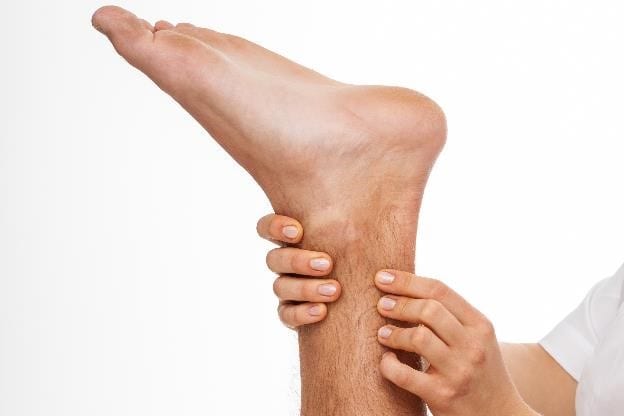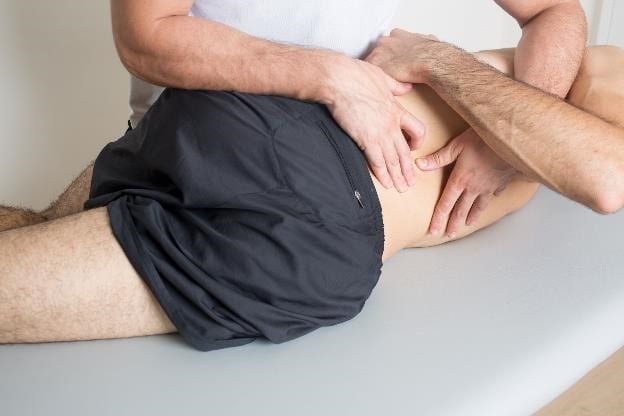PREVIOUS POST
How Chiropractic Can Help with 3 Common Car Crash Injuries

Please fill out the form below and we will be in touch soon.

How Chiropractic Can Help with 3 Common Car Crash Injuries

What Do Exercise and Nutrition Have to Do with Chiropractic Care?

For most people, sports are a fun way to exercise and compete. For professional athletes, their sport of choice is their livelihood.
Unfortunately, all sports often present injury risks. This is bad enough if you’re a “weekend warrior” and you don’t want to let your buddies down. If playing a sport is your profession, the setback from an injury can be devastating. Luckily, in many cases a chiropractor can help you recover faster and get you back out there sooner.
Below, we’re going to go over seven common sports injuries, how a chiropractor can help, and what you can do to prevent future injury.
Sprains and strains
Sprains occur when ligaments are stretched too far or torn. Bones are connected by ligaments, so sprains and strains occur in the joints. The most common sprains are in ankles or wrists. You may feel painful swelling and bruising, and experience a temporary inability to move your joint.
Strains occur when a muscle or tendon is torn. Tendons connect muscles to bones, and when they are pulled too far, a strain occurs. The most common strains occur in the back or hamstrings. You may feel painful swelling or spasms, and you may experience a temporary inability to move the muscle.
Knee injuries
Knee injuries are frequent problems for many athletes. Runners may experience what is known as runner’s knee, which is a tenderness near the knee cap. You may also experience pain on the sides of your knees and tendinitis.
Knees can be more severely injured with bruising to the bone or damage to cartilage and ligaments. Four major ligaments support the knee, and all can be damaged during sports activity. Knee injuries often occur from a lack of warming up, running too hard or too often, and blows or twists at the knee.
Swollen muscles
When certain muscles swell, they fill a tough membrane called the fascia. The fascia does not expand, so nerves and blood vessels are put under pressure, and the muscle itself may suffer damage. This painful condition is called compartment syndrome. It occurs in response to a one-time injury to the muscle, after repeated blows in certain sports like boxing, or due to long-term overuse.
Achilles tendon injuries

The Achilles tendon extends from the calf muscle to the heel. This tendon is commonly stretched or torn during sports activities. They occur from overuse and when stretching is not incorporated regularly in a training routine. They can be season-ending injuries.
Shin splints
This term describes pain along the shin bone, or tibia. This is the bone on the front of the lower leg. Shin splints are often experienced by runners.
They can occur when an athlete fails to warm up or stretch. They also occur due to overuse, engaging in activity on hard surfaces, and if you wear unsupportive shoes. People with flat feet may be more likely to get shin splints.
Dislocations
Contact sports and high-impact sports can cause dislocations, which happen when bones that form a joint become separated.
If a joint becomes dislocated, the athlete will feel intense pain, and nerves may also become damaged due to the dislocation. The joint will need to be put back into place, and you may need to wear a sling until swelling subsides, usually several weeks.
Rehabilitation is often recommended if your shoulder is dislocated. This therapy can restore strength and range of motion.
Fractures
A bone may break from either a one-time injury or from repeated stress over time. A one-time injury is an acute fracture which requires emergency treatment. A stress fracture happens in sports with repetitive impact. The pain in a stress fracture worsens when the athlete bears weight on the fractured area.
Contrary to popular belief, it isn’t wise to push through the pain of an injury. Seek medical treatment if you meet any of the following conditions:

An experienced chiropractor is also able to help in a number of ways. Sports massages can alleviate the pain and swelling incurred in an injury. They can also serve to optimize performance by stimulating healthy blood flow and warming up muscles. Hydromassage is another kind of chiropractic therapy which promotes athletic health.
Regular chiropractic treatment can reduce the risk of injury and improve performance. Contact us today for an appointment, and we’ll help you get back in the game.
About the Author:
Dr. Singer has been a practicing chiropractor for more than 20 years, and USA Health & Therapy has been around since 2004. Over the course of his career, Singer has helped tens of thousands of people with all kinds of issues by using a wide variety of treatment strategies. He has extensive knowledge of chiropractic modalities, including Gonstead, Diversified, Thompson Drop Table, and Activator, and in 1997 he earned a special adjunctive Chiropractic Certification in Spinal Trauma (CCST) to better provide care for car crash victims. Dr. Singer is licensed to practice chiropractic medicine in both Florida and New York.